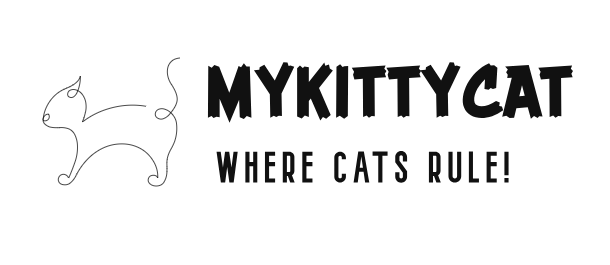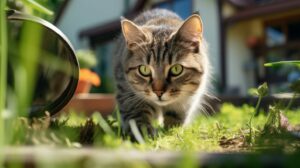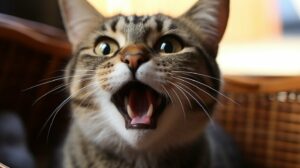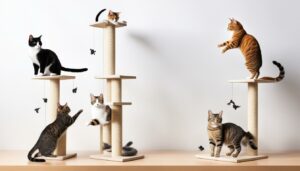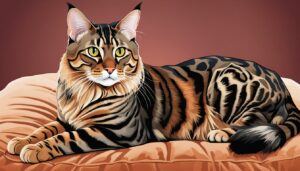An increasing number of people are discovering how wonderful cat ownership can be. Whether it be due to allergies or personal preference, some people may prefer cats that don’t shed as much. While no cat breed is completely hypoallergenic, there are several breeds that shed much less than others and are considered to be low-shedding or hypoallergenic. In this article, I will discuss the top five cat breeds that don’t shed much and are ideal for people with allergies or those who prefer a tidy home.
Key Takeaways
- The top 5 low-shedding cat breeds are Sphynx, Cornish Rex, Devon Rex, Peterbald, and Bengal.
- These breeds are suitable for individuals with allergies or those who prefer cats that don’t shed much.
- No cat is completely hypoallergenic, but low-shedding breeds can help minimize allergen exposure.
- Consider factors such as temperament, size, and compatibility with your lifestyle when choosing a low-shedding cat breed.
- Consult with a veterinarian and reputable breeders for guidance in finding the right cat for you and your family.
Is There Such a Thing as a 100% Hypoallergenic Cat?
While there is technically no such thing as a completely hypoallergenic cat, some cat breeds shed much less than others. This makes them more suitable for individuals with allergies. Cat allergies are usually triggered by the allergenic protein called Fel d 1, which is found in a cat’s sebaceous glands, skin dander, saliva, and urine. Since all cats produce these substances, there is always a risk of triggering an allergic reaction. However, cats that shed less distribute fewer allergens throughout the home and may be more tolerable for individuals with minor allergies.
Cat Breeds That Don’t Shed Much
When seeking a cat that sheds less, there are several low-shedding cat breeds that are worth considering. These breeds are sought after by individuals who prefer cats with minimal shedding and are suitable for people with allergies. Here are five cat breeds that don’t shed much:
- Sphynx: The Sphynx is a mostly hairless breed, so it doesn’t have fur to shed.
- Cornish Rex: The Cornish Rex has a unique coat that results in minimal shedding.
- Devon Rex: Like the Cornish Rex, the Devon Rex also has a coat that sheds minimally.
- Peterbald: The Peterbald is mostly hairless, similar to the Sphynx breed.
- Bengal: The Bengal has a short, silky coat that doesn’t shed much.
These cat breeds are known for their low-shedding characteristics, making them ideal for individuals who prefer cats that don’t shed as much. Whether you have allergies or simply prefer a tidy home, these breeds offer a great solution.
| Breed | Description |
|---|---|
| Sphynx | The Sphynx is a mostly hairless breed with a loyal and affectionate nature. |
| Cornish Rex | The Cornish Rex has a unique curly coat and is known for its energetic personality. |
| Devon Rex | The Devon Rex has a curly coat and is known for its small size and playful nature. |
| Peterbald | The Peterbald is mostly hairless and is a sociable and intelligent cat breed. |
| Bengal | The Bengal has a short, silky coat with beautiful wild-looking patterns and is highly athletic. |
These low-shedding cat breeds offer a variety of characteristics, from loyalty and affection to energy and athleticism. If you’re looking for a cat that sheds less and fits your lifestyle, these breeds are worth considering.
The Sphynx
The Sphynx is a unique and fascinating cat breed known for its striking appearance and distinctive characteristics. As a hairless cat breed, the Sphynx stands out among others, capturing the attention of cat lovers worldwide. Their hairlessness is a result of a natural genetic mutation, which gives them a truly extraordinary appearance.
But the Sphynx is much more than just their lack of fur. These cats are incredibly loyal, forming strong bonds with their human companions. They are known to be highly affectionate, often seeking out cuddles and snuggles. Many Sphynx owners describe their cats as “velcro cats,” as they have a tendency to stick close to their owners and crave human touch.
Not only are Sphynx cats loyal and affectionate, but they are also highly playful. They have an abundance of energy and love engaging in interactive playtime. Whether it’s chasing toys, climbing cat trees, or playing hide-and-seek, the Sphynx is always ready for a fun-filled adventure.
“My Sphynx cat is my constant companion. We have so much fun together, and she brings so much joy into my life.”
Additionally, Sphynx cats are known for their sociable nature. They generally get along well with children, other cats, and even well-behaved dogs. Their friendly and outgoing personality makes them a perfect fit for families looking for a new furry friend.
Given their unique characteristics and growing popularity, it’s important to obtain a Sphynx cat from a reputable breeder. Reputable Sphynx cat breeders prioritize the health and well-being of their cats, ensuring that they are ethically bred and properly cared for. When looking for a Sphynx cat kitten, be sure to research and choose a breeder who is knowledgeable about the breed and follows responsible breeding practices.
Overall, the Sphynx is a remarkable breed that combines a hairless appearance with a loving and playful personality. If you’re looking for a unique and affectionate feline companion, the Sphynx may be the perfect choice for you.
The Cornish Rex
The Cornish Rex is a small cat breed known for its unique curly coat. Originating from Cornwall, England in the 1950s, the Cornish Rex stands out among other breeds due to its distinct coat type. These cats have an energetic personality and love to run, jump, and play. They are always on the go, seeking new adventures and activities.
The Cornish Rex’s curly coat adds to its charm, but what sets it apart from other breeds is its minimal shedding. Despite their textured fur, Cornish Rex cats shed less compared to other cats, making them a great choice for individuals who prefer a tidy home. Their reduced shedding also means less time spent cleaning up loose hair.
To meet the Cornish Rex’s energetic nature and provide them with an outlet for their climbing instincts, it’s important to offer them a cat tree or other safe climbing spaces in your home. These intelligent felines love to explore vertical spaces, and having a designated area for them to climb will help satisfy their natural instincts.
With their playful disposition and striking appearance, the Cornish Rex is a delightful addition to any household. Whether they are engaging in a game of chase or relaxing on your lap, these small cats with curly coats are sure to bring joy and entertainment to your life.
Note: The image above features a Cornish Rex cat, showcasing its unique curly coat.
The Devon Rex
The Devon Rex is a unique cat breed known for its distinctive curly coat. Unlike the Cornish Rex, the Devon Rex has its own distinct genetic mutation that results in its unique coat texture. These cats are small in size and have an abundance of energy. They are highly active and enjoy engaging in activities such as jumping and climbing. Providing a cat climbing tree or other vertical spaces for them to explore and play on can help satisfy their natural instincts.
Despite their energetic nature, Devon Rex cats also have a calm and cuddly side. They love basking in the sun, enjoying moments of relaxation and warmth. Their affectionate personality makes them great companions for individuals and families looking for a loving and playful cat.
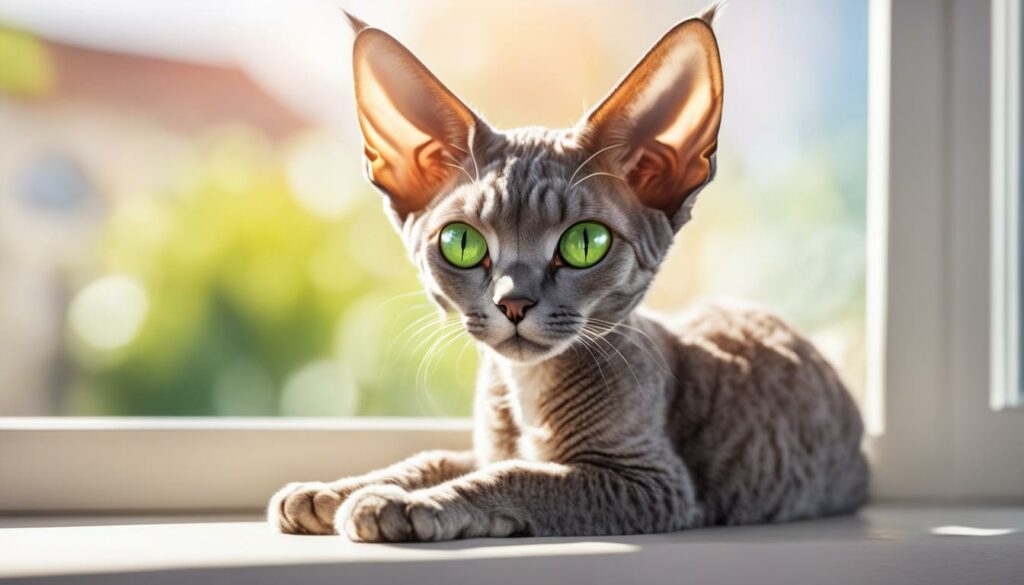
In addition to being known for their curly coat and playful nature, Devon Rex cats shed less compared to other breeds. This makes them a popular choice for individuals who prefer cats with minimal shedding. Their unique coat structure helps reduce the amount of fur that is shed, making them a low-maintenance option for cat owners.
Find a Reputable Devon Rex Cat Breeder
If you’re interested in adding a Devon Rex to your family, it’s important to find a reputable breeder. A trusted Devon Rex cat breeder can provide you with a healthy, well-socialized kitten that meets breed standards. They can also offer guidance and support as you navigate the unique needs of the Devon Rex breed.
When looking for a Devon Rex cat breeder, consider researching local breeders or contacting national breed associations for recommendations. Asking for referrals from other Devon Rex owners or attending cat shows and events can also help you connect with reputable breeders. Take the time to visit the breeder’s facility, interact with the cats and kittens, and ask questions about their breeding practices and the care they provide to their cats.
The Peterbald
The Peterbald is a hairless cat breed that results from a cross between the Sphynx and the Oriental Shorthair. While most Peterbald cats are mostly hairless, some may have patches of very fine and short fur. As a larger cat breed, they typically weigh around 14 pounds, making them a substantial presence in your home.
What sets the Peterbald apart is not just its unique appearance but also its sociability, intelligence, and trainability. These cats are known for their friendly and outgoing nature, making them a perfect choice for families with children, other cats, and even dogs. They thrive on companionship and enjoy being a part of the family.
The Peterbald’s intelligence and trainability make them highly responsive to training and capable of learning tricks and commands. Their sociable nature and interactive playfulness make training sessions an enjoyable bonding experience for both cat and owner. Whether it’s fetching, jumping through hoops, or performing other tricks, the Peterbald is up for the challenge.
Key Characteristics of the Peterbald:
- Breed: Peterbald
- Genetic Mix: Cross between Sphynx and Oriental Shorthair
- Hair Type: Mostly hairless, some may have patches of fine fur
- Size: Larger cat breed, average weight of 14 pounds
- Traits: Sociable, intelligent, and highly trainable
If you’re looking for a unique and fascinating companion, the Peterbald may be the perfect choice. Their distinctive appearance, sociability, and intelligence make them a captivating addition to any cat-loving household.
| Characteristic | Description |
|---|---|
| Hair Type | Mostly hairless with some patches of fine fur |
| Average Weight | Around 14 pounds |
| Temperament | Sociable, intelligent, and friendly |
| Trainability | Highly trainable and responsive to training |
The Bengal
The Bengal cat is a unique breed that originated from a cross between the domestic Tabby cat and the wild Asian Leopard Cat. Bengals have mostly domestic genes, making them a distinct breed of house cat. They have a short, silky coat with beautiful wild-looking patterns. Bengal cats are known for their athleticism, as they love to run, jump, and climb. They are also highly intelligent and trainable, making them a great choice for leash training and interactive play.
Bengal cats are a marvelous combination of beauty and agility. With their sleek appearance and active nature, they bring a touch of the wild into your home.
Bengal Cat Breeder
When considering getting a Bengal cat, it is important to find a reputable Bengal cat breeder. A reliable breeder will provide you with a healthy and well-socialized Bengal kitten. They will also be knowledgeable about the breed and can answer any questions you may have. Additionally, they can guide you on proper care and feeding, ensuring your Bengal cat thrives.
Bengal Cat Patterns
Bengal cats come in various patterns, each with its own unique charm. The most common Bengal cat patterns are:
- Spotted: This pattern resembles leopard spots, with distinctive spots scattered across the coat.
- Marbled: Marbled Bengals have a swirling pattern that resembles marble, with intricate markings.
- Rosetted: Rosetted Bengals have spots that form partially open circles, similar to the rosettes of a leopard.
The pattern and markings of a Bengal cat are part of what makes it so visually captivating and prized among cat enthusiasts.
Athletic Cat
Bengal cats are highly active and require regular exercise to stay happy and healthy. They enjoy interactive play sessions and activities that engage their natural hunting instincts. Providing them with toys, puzzle feeders, and a cat tree can help satisfy their need for mental and physical stimulation. This athletic nature also makes them adept at learning tricks and participating in agility training.
Leash Trained Cat
Due to their intelligence and adventurous spirit, Bengal cats can be trained to walk on a leash. This training allows them to explore the outdoor environment safely while under your supervision. With patience and positive reinforcement, you can teach your Bengal cat to be comfortable and obedient while on a leash, opening up a whole new world of experiences for both of you.
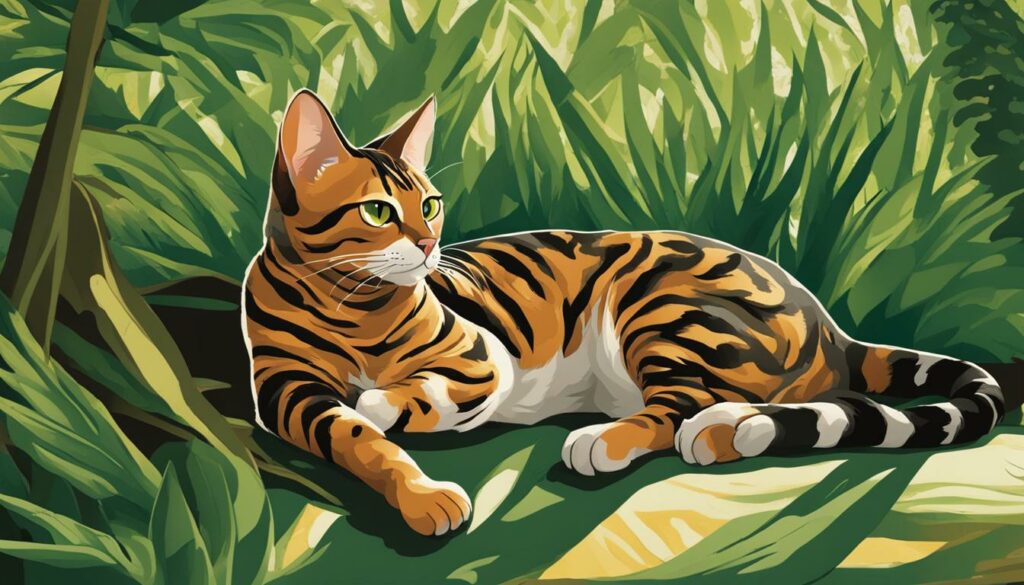
Conclusion
If you suffer from cat allergies or prefer cats that shed less, the top 5 low-shedding cat breeds mentioned in this article are a great place to start. While no cat is completely hypoallergenic, these breeds shed less compared to others, reducing the allergen exposure in your home. It is important to consider factors such as temperament, size, grooming needs, and compatibility with your lifestyle when choosing a low-shedding cat breed. Consulting with a veterinarian and reputable breeders can help ensure you find the right cat for you and your family.
Having a low-shedding cat can greatly improve the quality of life for individuals with allergies or those who prefer a tidy home. These low-maintenance cat breeds offer the perfect balance of companionship and minimal shedding, making them ideal for people with allergies. Remember to consider the specific needs and characteristics of each breed before making a decision. Consult with a qualified veterinarian and reputable breeders to find the best fit for you and your lifestyle.
Tips for Living with Low-Shedding Cats
- Regular grooming: While low-shedding cats require less grooming compared to other breeds, it is still important to brush their coat to remove loose hair and minimize the spread of allergens.
- Allergen control: Implementing strategies such as frequent vacuuming, dusting, and using air purifiers can help reduce allergens in your home and create a more allergy-friendly environment.
- Provide a safe and enriching environment: Low-shedding cats, like all cats, require mental and physical stimulation. Provide them with toys, scratching posts, and vertical spaces to climb to keep them entertained and prevent boredom.
- Proper nutrition: Feeding your low-shedding cat a balanced diet that meets their specific nutritional needs will help maintain their health and keep their coat in optimal condition.
- Regular vet check-ups: Schedule regular check-ups with your veterinarian to ensure your cat’s overall health and address any concerns or issues that may arise.
Benefits of Low-Shedding Cats
“Low-shedding cats offer several benefits to individuals with allergies or a preference for a clean and tidy home. Their minimal shedding reduces the amount of loose hair and dander in the environment, making them more suitable for people with allergies. Additionally, low-shedding cats are often low-maintenance, requiring less time and effort for grooming and cleaning. These breeds can be wonderful companions for individuals and families who want the joy of cat ownership without the hassle of excessive shedding.”
| Breed | Temperament | Size | Grooming Needs |
|---|---|---|---|
| Sphynx | Affectionate, friendly, outgoing | Medium to large | High (regular bathing required) |
| Cornish Rex | Active, playful, social | Small to medium | Low (occasional brushing) |
| Devon Rex | Curious, mischievous, people-oriented | Small to medium | Low (occasional brushing) |
| Peterbald | Intelligent, social, adaptable | Medium to large | Low (occasional brushing) |
| Bengal | Active, playful, confident | Medium to large | Low (minimal grooming required) |
Additional Resource: Lakeland Animal Clinic
If you’re thinking about adding a low-shedding cat breed to your family, Lakeland Animal Clinic in Lakeland, FL is here to provide the necessary care for your new feline companion. At Lakeland Animal Clinic, we offer a wide range of veterinary services tailored to meet the specific needs of your cat. From routine check-ups to vaccinations and specialized treatments, our experienced team is dedicated to ensuring the health and well-being of your furry friend.
One of the services we provide at Lakeland Animal Clinic is cat grooming. Our skilled groomers are trained to handle cats with care and expertise, ensuring a comfortable grooming experience for your feline companion. Whether your cat needs a simple nail trim or a full grooming session, we can help keep your cat looking and feeling their best.
If you or a family member is dealing with cat allergies, our team at Lakeland Animal Clinic can also provide guidance on managing allergies and recommend allergy-friendly breeds. We understand the unique challenges that come with having allergies and can offer advice on creating an allergy-friendly environment for both you and your cat.
For more information about our cat care services, grooming, or assistance with cat allergies, please don’t hesitate to contact Lakeland Animal Clinic at (863) 688-3338. You can also book an appointment online through our website. Our friendly and knowledgeable staff is ready to assist you and provide the care your feline companion deserves.
If you’re passionate about animal care and considering a career in the veterinary field, we invite you to explore veterinary career opportunities with Ascend Vets. Visit our careers page to learn more about how you can join our dedicated team and make a difference in the lives of pets and their owners.
Additional Resource: Cat Allergies and Management
Managing cat allergies is crucial for individuals who are allergic to cats but still desire to have one in their home. The American College of Allergy, Asthma & Immunology suggests avoiding cats as the best way to handle cat allergies. However, if you can’t resist having a cat as a pet, there are measures you can take to minimize allergies.
One approach is to use antihistamines, intranasal steroid sprays, and decongestants recommended by an allergist. These medications can help alleviate cat allergy symptoms. Additionally, washing your hands after petting your cat, using a lint roller to remove cat allergens from your clothes and furniture, and frequently vacuuming and dusting your home can help reduce allergen exposure.
Regular cat grooming is also essential in managing cat allergies. Brushing your cat regularly can help minimize the amount of loose fur and dander in your home. Moreover, utilizing HEPA filters in your home can help capture airborne allergens. Seeking advice from allergists and researching allergy-friendly cat breeds can provide valuable insights and guidance in managing cat allergies effectively.
